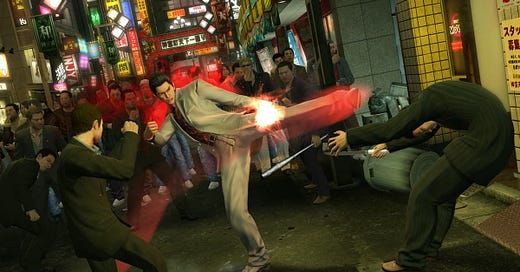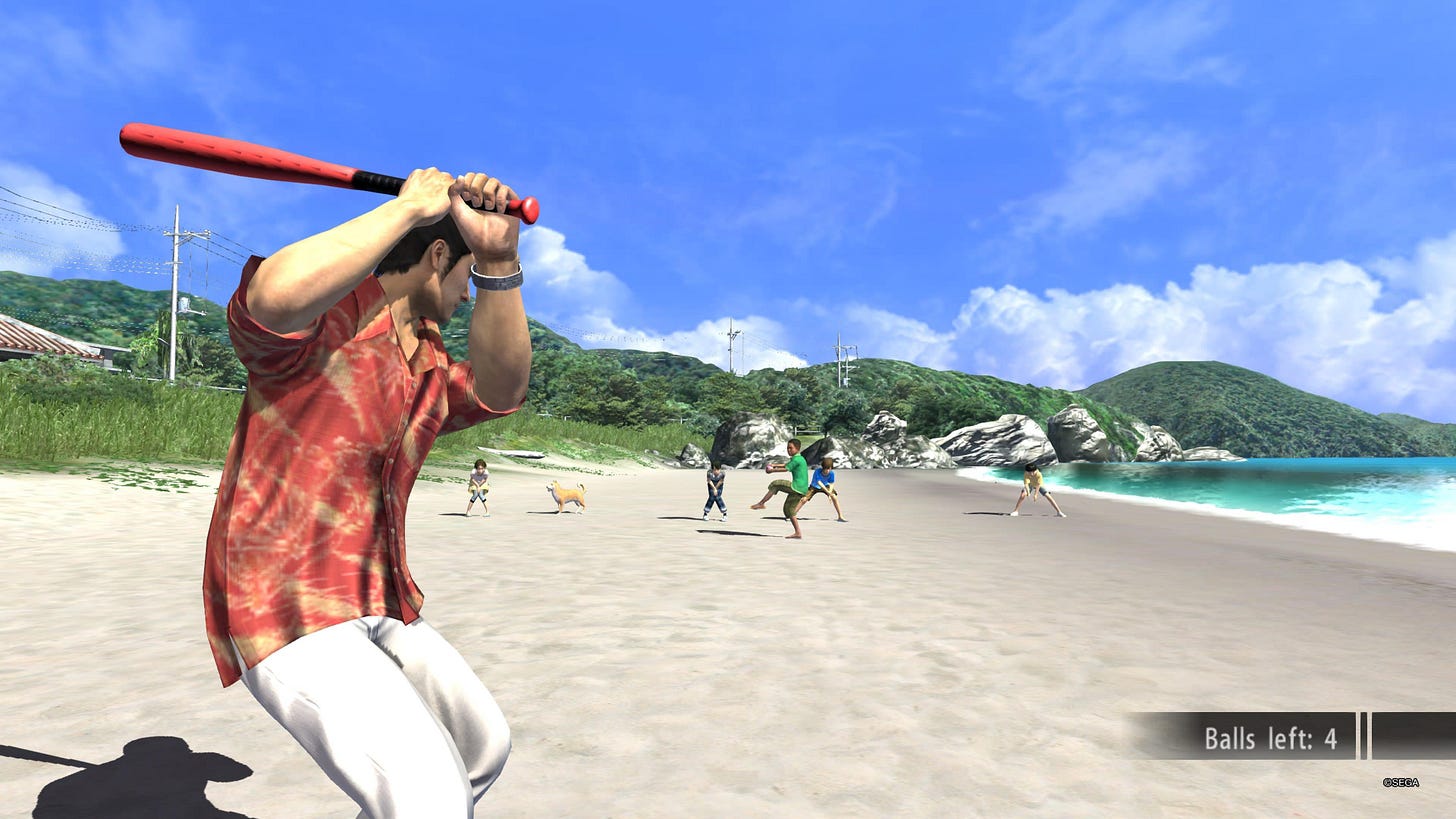Yakuza Kiwami's debut on the Nintendo Switch illustrates Ryu Ga Gotoku's most valuable asset: its flexibility in delivery
Piracy, jidaigeki, transitions to HD: the brand has become a universal proposition.
Save for the ignominious release of 龍が如く1+2 HD EDITION in 2013, yielding a paltry 2,000 sales within its first week, Like a Dragon, né Yakuza, has not attempted to render Kamurochō, nor Sotenbori upon Nintendo’s hardware. This anomaly can be attributed either to their system’s lesser means of power, or their family-friendly reputation sequestering titles of a mature persuasion. However, in a post-Doom conversion epoch, the erstwhile guardrails limiting conversation between ambitious home console titles and their portable contemporary have been gradually tucked away. Following Doom, a suite of current-generation titles migrated to the platform: The Witcher 3, Dying Light, and Kingdom Come: Deliverance were of particular improbability, due to their complex processes and intricacies. Furthermore, in parallel, last-generation titles in the vein of Persona 5, Alien: Isolation, and Alan Wake Remastered capitalised on the Switch’s standing as a slightly more powerful peer to the PS3 or an Xbox 360. Therefore, as both Yakuza 0 and Kiwami were accessible on the PlayStation 3, why did Sega wait to debut the latter until this very day?
Now, you can take Kiryu and friends along for your daily commute.
Aside from providing a canny, simultaneous measure of cross-promotion with the television adaptation of Kiwami - itself a comprehensive remake of the series’ inaugural, eponymous entry - the streamlined nature of the game makes it the easiest title to translate. Though Yakuza 0 was of a kindred generation, its dual cities and enormous breadth of content would make for a fair test of the Switch’s faculties - manual save means notwithstanding. Additionally, with the Switch’s successor finally, if not informally emerging from its chrysalis, Ryu Ga Gotoku Studio may prioritise ports of their entries powered by the demanding Dragon Engine: Infinite Wealth and the Judgment duology inclusive. The upgrade in tactility featured in Kiwami 2 against its predecessor greatly improves upon both locomotion and combat, perhaps to a degree outside of the Switch’s capacity - save for Hogwarts Legacy-esque incantations.
Thus, the upcoming Switch will likely receive ports of Like a Dragon (aka. Yakuza 7) and Infinite Wealth, the latter perhaps bundled with its prelude: The Man Who Erased His Name. These are the most urgent, best-selling stories in the series; Pirate Yakuza in Hawaii will dock in the Switch 2’s port swiftly thereafter. However, a greater discourse can be held on Ryu Ga Gotoku’s highly versatile timeline; they have made a fine art from the mechanical process of iteration. In 2023, the team unveiled Like a Dragon: Ishin! to a global audience, nine years from its formal debut in Japan. A remake powered by Unreal Engine 4, adopted by the studio to harness its “excellent lighting capabilities”, Ishin! was a bold gambit: it was the first time the series parted from its Yakuza moniker in the West, bearing particular mores intrinsic to its erstwhile audience. However, it emerged as a success, helping to drive the Like a Dragon series to 2.830 million sales through the 22-23 fiscal year. Curiously, the game was titled 龍が如く維新! 極 in Japan: Like a Dragon: Ishin! Kiwami - the original title was available on the PlayStation 4, marking less of a revelation and more of a revisit for this audience.
Ryu Ga Gotoku’s time warp to the Bakumatsu period dressed Kiryu as Sakamoto Ryōma.
Nevertheless, the novelty of noting series’ stalwarts as historical figures gave Ishin! the tone of a textured melodrama: chronology matters little against sound structural foundations. Replicating Kiryu’s model of vigilantism via sword and pistol reimagined the ultimate boundaries of the franchise for an entirely new audience, deferring to a familiar formula to sanction greater accessibility. This conscious repetition, reinterpreting pertinent assets to produce titles at a rate greater than their contemporaries, has sanctioned a shorthand both with their longtime fans and recent converts. Furthermore, its parallel mechanics of turn-based and brawler combat have cleverly stratified their creative ambition, appealing to JRPG aficionados and fans of the fighting genre in kind.
After Pirate Yakuza in Hawaii, the studio’s plans for the franchise have yet to be disclosed. Conventional wisdom suggests Kiwami 3 is an ineviability; director Masayoshi Yokoyama believes his team will remake the game “sooner or later”. Due to Infinite Wealth’s tropical milieu, speculation has centred upon a smooth recreation of Naha, Okinawa: a prominent component of Yakuza 3’s narrative. However, as the studio are preoccupied with chronicling Majima’s adventures in skullduggery in a revised spin on Hawaii, the team may want to return to a more terrestrial biome for its successor. In a mirrored respect to Ghost of Yōtei, Ichiban and co. could venture to the snowcapped preserve of Hokkaido, toying with novel snow particles whilst introducing a sense of mountaineous mysticism.
Yakuza Kiwami 3 would likely emerge as the first current-generation exclusive of the series; make sure to cool your PlayStation 4 accordingly before Majima’s pirate plight!
Ultimately, the Like a Dragon franchise has become an evergreen proposition. Amongst Sega’s stable of venerable properties, its contemporary vivacity and madcap melding of tones have helped to assert its place as a champion of the publisher’s resurgence. From karaoke to kyokushin, the series’ specificity is the core of its universality: how many grandiose crime dramas feature considered interpretations of Animal Crossing and Mario Kart?






